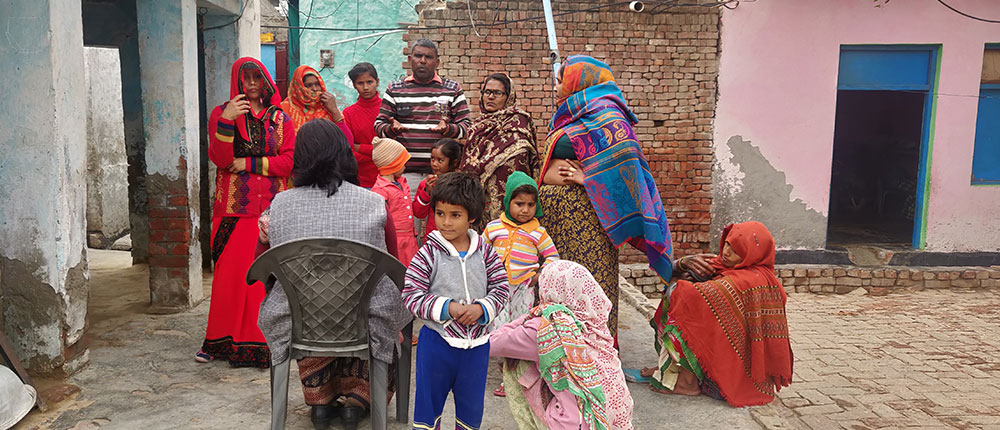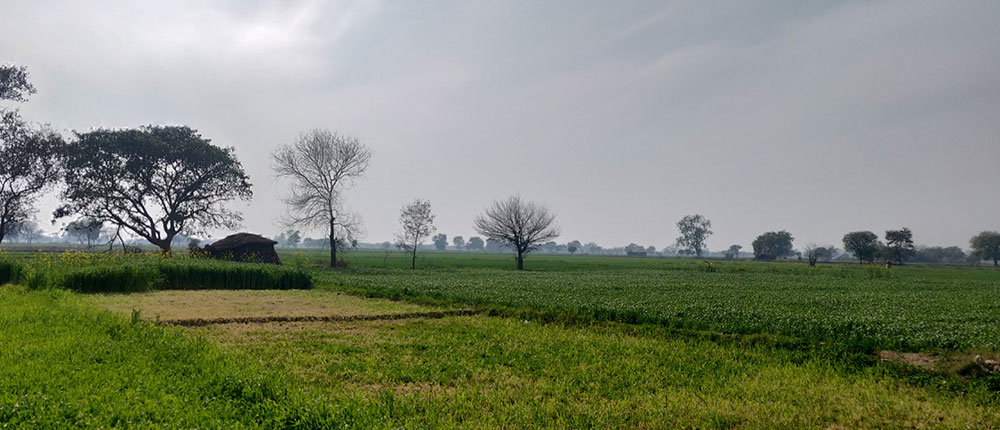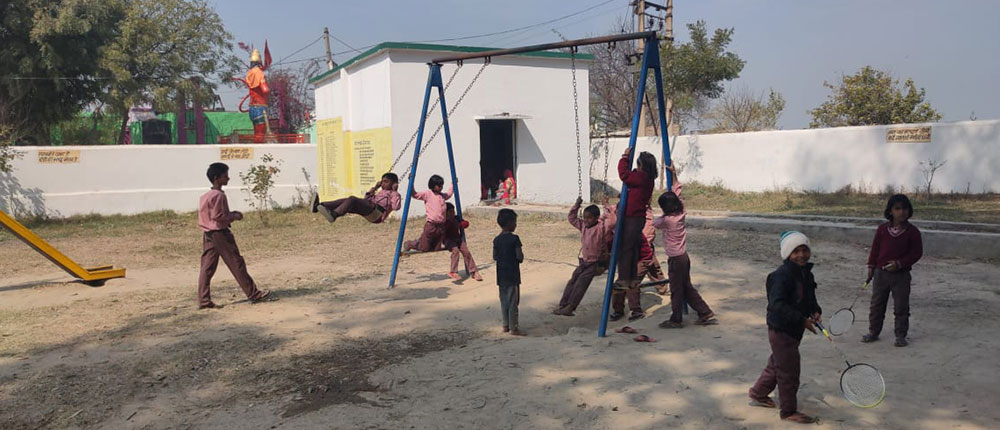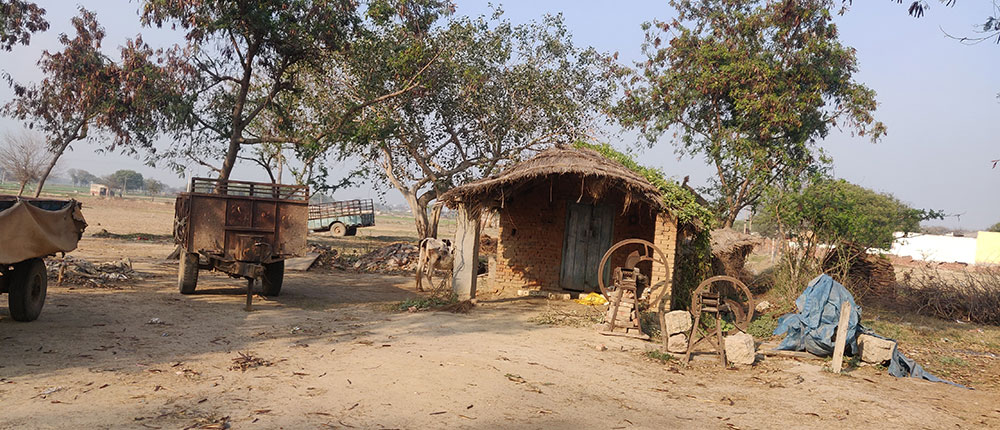TERI undertook a study to comprehend the perception of women to the prospective displacement and relocation to a new site following the acquisition of land for the proposed international airport.

The women of Rohi village in Jewar tehsil of Gautam Budh Nagar district are worried as they struggle to come to terms with an uncertain future. Traditionally, they have lived their lives within the bounds of social norms that closely define their role and the physical spaces they can inhabit, albeit, with some age-specific variations. They observe 'Purdah' (covering their faces) in the public sphere and before elders, particularly men. In addition to performing all the household chores, women shoulder the bulk of the responsibility of tending to cows and buffaloes – procuring fodder from fields, feeding and milking the cattle, preparing cow dung cakes and, at times, selling milk. Most women also work in the agricultural fields, sowing, weeding and harvesting the crops.
Their lives began to change in the summer of 2019 when the entire land of Rohi village was acquired under The Right to Fair Compensation and Transparency in Land Acquisition, Rehabilitation and Resettlement Act (RFCTLARR) Act, 2013 for the development of the first phase of an international airport in Jewar district of Gautam Budh Nagar in Uttar Pradesh. The village population is likely to be relocated soon to a new site at 'Jewar Bangar', about 10 kms from Rohi. While the compensation for the agricultural land has been disbursed to the title holders, the District Magistrate is yet to pass the R&R Awards for each affected family in consonance with the Second Schedule of the Act, though the R&R entitlements have been orally communicated to the villagers during public hearings.
The monetization of agricultural land is likely to have adverse consequences for women. The cash compensation for farm land have been transferred to the bank account of the titleholders, who are invariably men. Most of the surveyed women expressed ignorance of the amount of compensation received by husbands/fathers-in-law or the purposes for which it is being expended. A large number of them had not attended the public hearings organized by the district administration as part of the land acquisition proceedings because they were unaware or actively discouraged by menfolk. Customarily, agricultural holdings are a source of earning as well as a marker of social status of a household. Sale of land is frowned upon by the community as it is indicative of a decline in family fortune. Land holding, even in the name of husband, ensures food security to women and children and provides the socio-cultural network in which the women are nested. The loss of agricultural land coupled with women's exclusion from all the decision-making related to the family's economic future has heightened their sense of powerlessness, given their absolute financial dependence on men now.

The relocation to 'Jewar Bangar' will also mark an end of the productive roles of women. All along, they have contributed to the family's finances by working in agricultural fields and tending to milch cattle that provides milk for consumption at home as well as money from sale. In a society that disapproves of women's engagement in paid employment, the closure of traditional productive avenues will limit women's role to the performance of domestic chores. The existing literature on the gender impact of displacement points to a significant reduction in women's voice in family decisions, once they are totally confined to homes.

The landless women-headed households that rely on milch cattle or farm labour for sustenance face the risk of impoverishment as they are deprived of sources of earning presently available in the village. The resettlement colony is unlikely to provide vacant land or common property resources that indigent women have accessed in the village. As a widow, who supports her family from the sale of milk, poignantly said, “we have been handed a begging bowl”. In fact, the absence of any plan for skill development or creation of income generating opportunities may pose an economic challenge to the villagers in the future.
The Rehabilitation & Resettlement policy-related practices of the Gautam Budh Nagar district administration, which is the Acquiring Body, is adding to the dispossession of women. The RFCTLARR Act, 2013 provides for the payment of Rs 5,00,000, in lieu of job, and Rs 50,000 transportation allowance to each displaced family. The Act defines 'family' as a married couple with minor children and dependent siblings. An adult of either gender, with or without a spouse or children or dependent, as well as deserted, widowed and divorced women will be considered as separate families. In the case of married couples, the amount is being deposited in the bank account of the husband rather than the joint account of the couple. It has been reported that, instead of offering a constructed house of a 50 square metre plinth area, the displaced families are being given plots of 50 square metre and cash, which is twice the value of debris of the existing house, for the construction of house at the relocation site. The plots are likely to be registered in the name of husbands and the cash for construction will be handed to them. The failure to provide constructed houses to displaced families enhances women's vulnerability because the manner of utilization of the construction money will be the prerogative of husbands.

The Jewar international airport project is planned over 5000 hectares of land in Gautam Budh Nagar district, for which land will be acquired from scores of villages in a phased manner. The potentially adverse impacts of displacement on women need to be studied and addressed from the outset, lest it becomes a tragedy for the affected families.
The article is based on the field study conducted in February 2020 by The Energy and Resources Institute (TERI) in the village of Rohi in Jewar tehsil, Gautam Budh Nagar district of Uttar Pradesh to gain insight into the likely impact of impending displacement on women. Primary data was collected through household surveys, Focused Group Discussions and interview of key informants.

